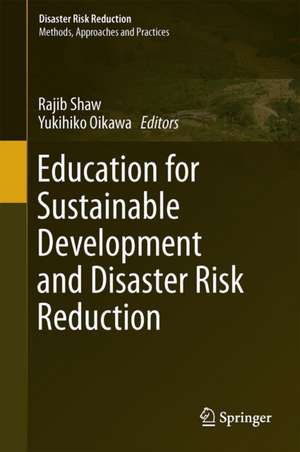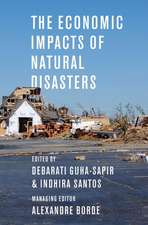Education for Sustainable Development and Disaster Risk Reduction: Disaster Risk Reduction
Editat de Rajib Shaw, Yukihiko Oikawaen Limba Engleză Hardback – 21 aug 2014
The book has 11 chapters, drawing lessons mainly from Japan and discussing their implications for the world. The first four chapters provide an overview of the ESD–DRR linkage, ESD and its evolution, DRRE and Climate Change Education. These are followed by case studies from ESD practices in Japan, in schools, universities and communities.
The primary target groups for this book are students and researchers in the fields of environment, disaster risk reduction and climate change studies. The book provides them with a good idea of the current research trends in the field and furnishes basic knowledge about these vital topics. Another target group comprises practitioners and policy makers, who will be able to apply the knowledge collected here to establishing policy and making decisions.
| Toate formatele și edițiile | Preț | Express |
|---|---|---|
| Paperback (1) | 635.65 lei 43-57 zile | |
| Springer – 22 sep 2016 | 635.65 lei 43-57 zile | |
| Hardback (1) | 641.85 lei 43-57 zile | |
| Springer – 21 aug 2014 | 641.85 lei 43-57 zile |
Din seria Disaster Risk Reduction
- 18%
 Preț: 796.61 lei
Preț: 796.61 lei -
 Preț: 394.30 lei
Preț: 394.30 lei - 18%
 Preț: 790.46 lei
Preț: 790.46 lei - 15%
 Preț: 654.12 lei
Preț: 654.12 lei - 18%
 Preț: 967.08 lei
Preț: 967.08 lei - 24%
 Preț: 640.27 lei
Preț: 640.27 lei - 18%
 Preț: 1009.16 lei
Preț: 1009.16 lei - 18%
 Preț: 890.54 lei
Preț: 890.54 lei - 18%
 Preț: 942.94 lei
Preț: 942.94 lei - 15%
 Preț: 646.30 lei
Preț: 646.30 lei - 18%
 Preț: 782.24 lei
Preț: 782.24 lei - 18%
 Preț: 898.75 lei
Preț: 898.75 lei - 18%
 Preț: 956.33 lei
Preț: 956.33 lei - 18%
 Preț: 947.50 lei
Preț: 947.50 lei - 15%
 Preț: 643.34 lei
Preț: 643.34 lei - 24%
 Preț: 921.07 lei
Preț: 921.07 lei - 18%
 Preț: 951.91 lei
Preț: 951.91 lei - 18%
 Preț: 894.97 lei
Preț: 894.97 lei - 24%
 Preț: 639.86 lei
Preț: 639.86 lei - 18%
 Preț: 790.14 lei
Preț: 790.14 lei - 18%
 Preț: 729.18 lei
Preț: 729.18 lei - 18%
 Preț: 784.13 lei
Preț: 784.13 lei - 18%
 Preț: 783.50 lei
Preț: 783.50 lei - 18%
 Preț: 784.48 lei
Preț: 784.48 lei - 24%
 Preț: 698.99 lei
Preț: 698.99 lei - 15%
 Preț: 642.18 lei
Preț: 642.18 lei - 15%
 Preț: 651.51 lei
Preț: 651.51 lei - 18%
 Preț: 943.57 lei
Preț: 943.57 lei - 15%
 Preț: 649.54 lei
Preț: 649.54 lei - 24%
 Preț: 690.45 lei
Preț: 690.45 lei - 24%
 Preț: 899.52 lei
Preț: 899.52 lei - 18%
 Preț: 962.27 lei
Preț: 962.27 lei - 15%
 Preț: 652.17 lei
Preț: 652.17 lei - 15%
 Preț: 646.75 lei
Preț: 646.75 lei - 20%
 Preț: 587.28 lei
Preț: 587.28 lei - 15%
 Preț: 647.40 lei
Preț: 647.40 lei - 18%
 Preț: 957.75 lei
Preț: 957.75 lei
Preț: 641.85 lei
Preț vechi: 755.13 lei
-15% Nou
Puncte Express: 963
Preț estimativ în valută:
122.81€ • 128.58$ • 101.62£
122.81€ • 128.58$ • 101.62£
Carte tipărită la comandă
Livrare economică 07-21 aprilie
Preluare comenzi: 021 569.72.76
Specificații
ISBN-13: 9784431550891
ISBN-10: 4431550895
Pagini: 200
Ilustrații: XI, 187 p. 49 illus., 37 illus. in color.
Dimensiuni: 155 x 235 x 22 mm
Greutate: 0.46 kg
Ediția:2014
Editura: Springer
Colecția Springer
Seria Disaster Risk Reduction
Locul publicării:Tokyo, Japan
ISBN-10: 4431550895
Pagini: 200
Ilustrații: XI, 187 p. 49 illus., 37 illus. in color.
Dimensiuni: 155 x 235 x 22 mm
Greutate: 0.46 kg
Ediția:2014
Editura: Springer
Colecția Springer
Seria Disaster Risk Reduction
Locul publicării:Tokyo, Japan
Public țintă
ResearchCuprins
Overview of Concepts: Education for Sustainable Development and Disaster Risk Reduction.- Education for Sustainable Development: Trends and Practices.- Disaster Risk Reduction Education: Issues and Challenges.- Climate Change Education: Recent Trends and Future Prospects.- Disaster-affected schools and school districts after the East Japan Earthquake and Tsunami: Issues for recovery education.- Governance and Policy on ESD.- View on Education for Disaster and Recovery: Example of R.C.E. Greater Sendai.- Exchange and Sharing of Experiences of ESD-DRR: An International Workshop For Asian Youth.- ESD and Education for Disaster Risk Reduction (DRR) at Schools: Changes in DRR Education after Great East Japan Earthquake.- City Level Response: Linking ESD and DRR in Kesennuma.- Towards the Establishment of Sustainable Campus.
Notă biografică
Rajib Shaw
Rajib Shaw is a Professor in the Graduate School of Global Environmental Studies of Kyoto University, Japan. He worked closely with the local communities, NGOs, governments and international organization, including United Nations, especially in the Asian countries. He is currently the Chair of the United Nations Asia Regional Task Force for Urban Risk Reduction and the President of Asian University Network of Environment and Disaster Management (AUEDM). His research interests are: community based disaster risk management, climate change adaptation, urban risk management, and disaster and environmental education. He has published several books in the field of disaster and environmental management. He is also the Chief Editor of Asian Journal of Environment and Disaster Management.
Yukihiko Oikawa
Yukihiko Oikawa is a Researcher of Miyagi University of Education, an Associate Researcher of the University of Tokyo and Senior Advisor of SEEDS Asia, a Japanese non-profit organization. He was the former Deputy Director of Kesennuma City Board of Education. He has been promoting Education for Sustainable Development (ESD) over ten years at regional and national level, collaborating with local sectors, universities, Japanese government, NGO/NPO and international institution such as UNESCO, United Nation University (UNU) and Fulbright Fund. Since the East Japan Earthquake and Tsunami (EJET) in 2011, he has been contributing to educational recovery of post-disaster in Kesennuma City utilizing the network of ESD, and to improvement of DRR Education based on lessons of EJET and the concept of ESD.
Rajib Shaw is a Professor in the Graduate School of Global Environmental Studies of Kyoto University, Japan. He worked closely with the local communities, NGOs, governments and international organization, including United Nations, especially in the Asian countries. He is currently the Chair of the United Nations Asia Regional Task Force for Urban Risk Reduction and the President of Asian University Network of Environment and Disaster Management (AUEDM). His research interests are: community based disaster risk management, climate change adaptation, urban risk management, and disaster and environmental education. He has published several books in the field of disaster and environmental management. He is also the Chief Editor of Asian Journal of Environment and Disaster Management.
Yukihiko Oikawa
Yukihiko Oikawa is a Researcher of Miyagi University of Education, an Associate Researcher of the University of Tokyo and Senior Advisor of SEEDS Asia, a Japanese non-profit organization. He was the former Deputy Director of Kesennuma City Board of Education. He has been promoting Education for Sustainable Development (ESD) over ten years at regional and national level, collaborating with local sectors, universities, Japanese government, NGO/NPO and international institution such as UNESCO, United Nation University (UNU) and Fulbright Fund. Since the East Japan Earthquake and Tsunami (EJET) in 2011, he has been contributing to educational recovery of post-disaster in Kesennuma City utilizing the network of ESD, and to improvement of DRR Education based on lessons of EJET and the concept of ESD.
Textul de pe ultima copertă
Education for Sustainable Development (ESD) and Disaster Risk Reduction Education (DRRE) have overlapping areas of concern focusing on strengthening the link to local communities. In reality, there is significant synergy in ESD and disaster risk reduction (DRR). Both concepts urge looking at the communities, both focus on behavior changes, and both call for linking knowledge to action. The Decade of Education for Sustainable Development (DESD) ends in 2014, and the Hyogo Framework for Action (HFA) ends in 2015. Therefore, at this junction, it is important to review the progress made over the past 10 years and to suggest future synergy options. This book is the first attempt to review these two emerging fields and to provide input to the future direction of education.
The book has 11 chapters, drawing lessons mainly from Japan and discussing their implications for the world. The first four chapters provide an overview of the ESD–DRR linkage, ESD and its evolution, DRRE, and Climate Change Education. These are followed by case studies from ESD practices in Japan, in schools, universities, and communities.
The primary target groups for this book are students and researchers in the fields of environment, disaster risk reduction, and climate change studies. The book provides them with a good idea of the current research trends in the field and furnishes basic knowledge about these vital topics. Another target group comprises practitioners and policy makers, who will be able to apply the knowledge collected here to establishing policy and making decisions.
The book has 11 chapters, drawing lessons mainly from Japan and discussing their implications for the world. The first four chapters provide an overview of the ESD–DRR linkage, ESD and its evolution, DRRE, and Climate Change Education. These are followed by case studies from ESD practices in Japan, in schools, universities, and communities.
The primary target groups for this book are students and researchers in the fields of environment, disaster risk reduction, and climate change studies. The book provides them with a good idea of the current research trends in the field and furnishes basic knowledge about these vital topics. Another target group comprises practitioners and policy makers, who will be able to apply the knowledge collected here to establishing policy and making decisions.
Caracteristici
Constitutes the first attempt, at the 10th year of the decade of ESD and HFA [Hyogo framework for Action], to analyse these two sectors together Comprises a combination of theory, case study and analysis Collects diverse perspectives from authors including academicians, practitioners and professionals in the respective field







